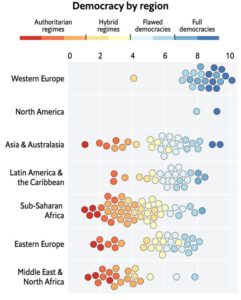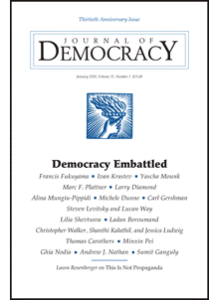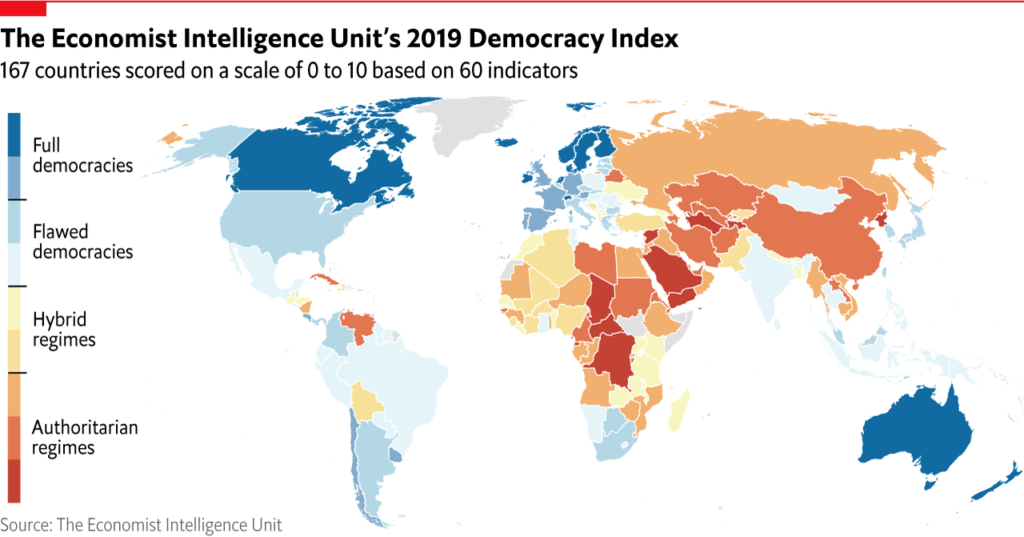Global democracy has had another bad year, but popular protests show the potential for democratic renewal, The Economist Intelligence Unit reports.
After showing stagnation in 2018, the EIU’s Democracy Index – which assesses the global state of democracy – deteriorated once again in 2019 to the lowest global score seen since the index’s inception in 2006.
 The Democracy Index for 2019 found that democratic backsliding across the world has led to the worst score since the index was first produced in 2006, with only 5.7 percent of the global population living in what could be considered a “full democracy,” POLITICO adds:
The Democracy Index for 2019 found that democratic backsliding across the world has led to the worst score since the index was first produced in 2006, with only 5.7 percent of the global population living in what could be considered a “full democracy,” POLITICO adds:
The index assessed 167 countries on the basis of five categories: electoral process and pluralism; the functioning of government; political participation; political culture; and civil liberties. Most Western European countries were considered full democracies, with Norway scoring the highest worldwide, while most Eastern European nations were considered flawed democracies or “hybrid” regimes.
Other key findings in the report include:
- Only 5.7% of the world’s population lives in a “full democracy” and more than one-third under authoritarian rule.
- The number of “full democracies” increased to 22, as Chile, France and Portugal moved up from the “flawed democracy” category.
- Thailand registered the biggest improvement in score and China the sharpest decline.
- The average global score for four out of the five categories of the Democracy Index (electoral process and pluralism; the functioning of government; political culture; civil liberties) declined in 2019. The exception was political participation, the score for which improved worldwide.
“If 2016 was notable for the populist insurgency against the status quo in the developed democracies, 2019 was defined in large part by a wave of popular protest in the developing world,” said Joan Hoey, the editor of the report. “Both expressed a demand for more popular sovereignty and better political representation and both hold out the potential for a regeneration of democracy.” Download the free report here.
 The EIU report confirms Francis Fukuyama’s argument that democracies are grappling with an era of transformation: Identity is increasingly replacing economics as the major axis of world politics. Technological change has deepened social fragmentation, and trust in institutions is falling. As our most basic assumptions come under question, can liberal democracy rebuild itself? he asks in the latest issue of the National Endowment for Democracy’s Journal of Democracy.
The EIU report confirms Francis Fukuyama’s argument that democracies are grappling with an era of transformation: Identity is increasingly replacing economics as the major axis of world politics. Technological change has deepened social fragmentation, and trust in institutions is falling. As our most basic assumptions come under question, can liberal democracy rebuild itself? he asks in the latest issue of the National Endowment for Democracy’s Journal of Democracy.
Today, there are two opposite trends in the world, he writes:
- The first is social fragmentation and its concomitant, the decline of the authority of mediating institutions, primarily in established democracies.
- The second is the rise of new centralized hierarchies in authoritarian states.
Surviving the present means rebuilding the legitimate authority of the institutions of liberal democracy, while resisting those powers that aspire to make nondemocratic institutions central, Fukuyama contends. RTWT








